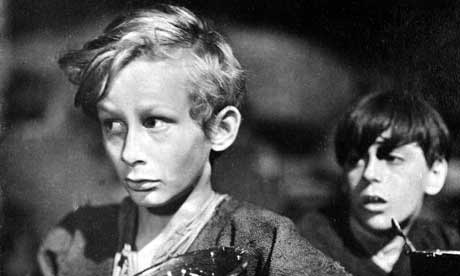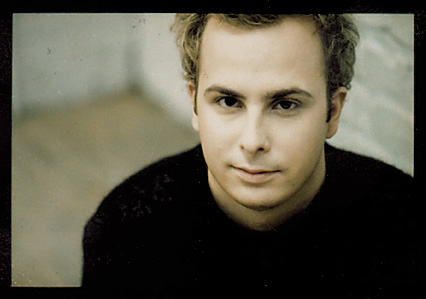Well, not quite. It breaks down to eight new shows in the main house and six on the Werskstatt studio stage.
And there’s a new venue – a converted former power station. Quite an enterprise to put on 370 events in a season.
Here’s the full release:

BARENBOIM’S 2011/12 BERLIN STAATSOPER SEASON FEATURES OPERA’S BIGGEST STARS IN THRILLING NEW PRODUCTIONS AND BELOVED REVIVALS
The 2011/2012 Berlin Staatsoper season, its second at the Schiller Theater while the company’s home on the historic Unter den Linden is being renovated, will feature eight new productions on the main stage as well as six additional new productions on the Werkstatt studio stage. In addition, there will be one visiting production, two operatic concerts, 19 operas from the repertoire, over 80 concerts, the annual Festtage series at Easter, the second year of the Infektion! festival of contemporary music theater, one new and four repertoire productions by the Staatsballett Berlin, a continuation of the Schlaflos in Charlottenburg series in the foyer, and numerous projects by the Junge Staatsoper. The Staatsoper’s program comprises an impressive total of 370 events during the season.
The Staatsoper’s season will open on 3 October 2011 with Leoš Janá?ek’sFrom the House of the Dead in a production staged by Patrice Chéreau and conducted by Simon Rattle. Following her Wozzeck production in 2011, Andrea Breth will direct Alban Berg´s Lulu for the 2012 Festtage, once again with Daniel Barenboim conducting. Further premieres will include The Bartered Bride by Bed?ich Smetana (Karl-Heinz Steffens/Balász Kovalik), Orpheus in the Underworld by Jacques Offenbach in a new production by Christoph Israel and Thomas Pigor (Christoph Israel/Philipp Stölzl), Il Trionfo del Tempo e del Disinganno by Georg Friedrich Händel (Marc Minkowski/Jürgen Flimm),Rappresentatione di Anima et di Corpo by Emilio de’ Cavalieri (René Jacobs/Achim Freyer) and Dionysos by Wolfgang Rihm (Ingo Metzmacher/Pierre Audi). With the premiere of Luigi Nono’s Al gran sole carico d´amore (Ingo Metzmacher/Katie Mitchell), the Staatsoper will inaugurate a new venue, the “Kraftwerk Mitte”, a former power station. A guest production from the Teatro alla Scala di Milano will see Daniel Barenboim conducting Mozart’s Don Giovanni, featuring Anna Netrebko and Christopher Maltman.
Two operas in concert will also be presented: Montezuma by Carl Heinrich Graun, starring Vesselina Kasarova and Pavol Breslik, and Bellini’s Normawith Edita Gruberova, Sonia Ganassi and Johan Botha. Daniel Barenboim will conduct the Staatskapelle in four concert programs as well as the traditional New Year’s concert, two charity events for the reconstruction of the Staatsoper Unter den Linden, a gala concert celebrating the tenth anniversary of the Jewish Museum Berlin, and three symphony concerts with both the Staatskapelle and the Filarmonica della Scala as part of the Festtage 2012. The concert soloists include Anna Netrebko, El?na Garan?a, Anne-Sophie Mutter, Alisa Weilerstein, Jonas Kaufmann, Maurizio Pollini and Radu Lupu. The Barenboim Cycle will offer collaborations with Christine Schäfer, Dorothea Röschmann and Thomas Quasthoff. In addition, René Pape will perofrm a song recital with Daniel Barenboim as accompanying pianist as part of the 2012 Festtage.
The Staatsoper will also present a six-part piano cycle featuring Daniel Barenboim as well as his colleagues Yuja Wang, András Schiff and Pierre-Laurent Aimard. On 30 June 2012 the performance of Mozart’s Don Giovanniwith Anna Netrebko at the Schiller Theater will be shown live on the Bebelplatz, followed on 1 July 2012 by a concert with Daniel Barenboim and the Staatskapelle Berlin.
Summer’s ending and everyone’s totting up their totals. I looked onto a friend’s screen the other day and saw a statistic so breathtaking she had to sit me down and make me a cup of tea.
When is an opera house full or sold-out? Usually when there’s just one or two hundred tickets left for sale. But what about a whole season – when is that ever sold out?
Glyndebourne ends in a week or so and the final tallies are being made. The four-month summer festival, unsupported by public funds, needs to sell 92 percent of tickets to break even. Recently it has been running along very nicely at 97 or thereabouts.
Many of the tickets are priced at £190 (same in Euros, or $350). That’s steep. Some £30 tickets are reserved for under-30s and £10 for standing room at the top balcony.
This summer, Glyndebourne has sold – wait for it – 99.18 percent of all seats to all shows*, including the less-obvious Rinaldo and Turn of the Screw that rarely sell out at major opera houses.

Put another way, Glyndebourne has been sold out all summer.
Beat that, anyone.

* Actually slightly higher by the last performance, five days later. See here.
John Howard Davies directed early episodes of Monty Python and the entire run of Fawlty Towers for the BBC. Reports of his death are coming in from entertainment industry colleagues.
As a child, he was Oliver Twist in David Lean’s memorable film.

As head of comedy at the BBC from 1977 to 1982, he was responsible for launching such classic shows as Only Fools and Horses, Yes Minister and Allo, Allo!
John was 72. Sad day.
Here‘s a BBC appreciation.

Ain’t No Mountain High Enough is one Nick Ashford wrote for his ever-loving wife Valerie Simpson.
He has died in New York, the same day as Jerry Leiber.

Yannick Nézet-Séguin is adding a week to his Philadelphia season and not charging for his services, my Montreal colleague Arthur Kapitanis reports. “It’s a wonderful sign of his commitment to the Philadelphia cause,” said Philadelphia Orchestra CEO Allison Vulgamore.
Hmmmm…. I wonder.
Given the states of Philly’s finances, a week’s maestro pay more or less won’t make much difference. The players will, of course, have to be paid for the week’s work. So what’s the point?
The players last week overwhelmingly rejected the board’s bankruptcy strategy, which stumbles from one confusion to the next.
A letter from the orchestra management (below) takes issues with these perceptions, but i see no reason to withdraw them. I know of several conductors who are quietly taking pay cuts to help their orchestras. No announcement is made, nor should it be. The fuss that Ms Vulgamore seems keen to make about Nézet-Séguin’s voluntary week strikes me as a publicity ploy to secure a mirage of support for her policy.
Your views?

Dear Norman,
We saw your blog post about Yannick Nézet-Séguin’s decision to volunteer additional time and services to The Philadelphia Orchestra and noticed two errors that we wanted to correct.
First, while Mr. Nézet-Séguin is donating his services to the Orchestra, the week he is now conducting – in November 2011 – is not newly added to the schedule as your blog indicates. Further, the Musicians of The Philadelphia Orchestra are not being asked to play an additional week beyond what is currently scheduled for 2011-2012 and thus, will not “have to be paid for the extra week’s work,” as you wrote. Nicholas McGegan, who was previously announced as the conductor of that week’s performances, has graciously revised his calendar to return to The Philadelphia Orchestra in April 2013 with the originally scheduled all-Bach program (Brandenburg Concertos 1-4 and Orchestral Suite No. 3). Mr. Nézet-Séguin will now lead the Orchestra in an Italian themed program, in its place, featuring Tchaikovsky’s Francesca da Rimini, Mendelssohn’s “Italian” Symphony, Verdi’s Overture to La forza del destino and Respighi’s The Pines of Rome.
Second, your blog notes that the Musicians of the Philadelphia Orchestra “voted last week 8-1 to reject the board’s bankruptcy strategy.” There was no vote taken of which the Association is aware to “reject the bankruptcy strategy.” Rather, a letter from the Musicians, expressing concern and dissent regarding certain aspects of the strategic plan, was received by Allison Vulgamore, President and CEO of The Philadelphia Orchestra, and Richard Worley, Chairman of The Philadelphia Orchestra Board of Directors, on the afternoon of Wednesday, August 17. However, this letter was only received by the intended recipients after it had been shared with a third party and printed in local media.
Corrections to your post regarding these important points would be very much appreciated.
My Best,
Kate Johnston
Kate Johnston
Assistant Director of Public Relations
The Philadelphia Orchestra
Peter Nero and the Philly Pops®
260 South Broad Street, 16th floor
Philadelphia, PA 19102
Gustav Mahler is centre stage at the 14th Beijing Music Festival, just announced. Details here. Press release below.

14th Beijing Music Festival (BMF) pays homage to Mahler
Crossover dialogues that “deconstruct” the classical Mahler
One of the major annual cultural highlights in the Chinese capital, the Beijing Music Festival (BMF) is dedicated to presenting high-quality classical music performances, commissioning new works and advocating outreach programs and music education for the general public. During the past 13 years, the BMF’s diverse programs traverse musical cultures both from China and the West, tradition and modernity, sharing with the audience both the profound cultural heritage and potent vibrancy of classical music.
2011 marks the centennial of the death of the great Austrian composer Gustav Mahler (1860–1911). The 14th Beijing Music Festival, which will open on October 6, wholeheartedly offers Beijing audiences a magnificent yet innovative musical commemoration. During the 25 days of this Festival, 22 concerts, ranging from symphonies, chamber music, solos, choruses, and all the way to jazz, will be presented. Among the repertoire are 18 complete works by Mahler. Apart from his complete symphonic output, his major vocal repertoire and the early piano quartet will also be presented. This also marks the BMF’s first foray in celebrating a single composer.
Conducting maestros Charles Dutoit, Christoph Eschenbach, Eliahu Inbal, Manfred Honeck, Yuri Temirkanov and Daniel Harding will collaborate with such illustrious Chinese orchestras as the China Philharmonic Orchestra, Shanghai Symphony Orchestra, Guangzhou Symphony Orchestra, China National Symphony Orchestra and Beijing Symphony Orchestra. Asia’s distinguished Singapore Symphony Orchestra is also invited to appear in the BMF this year. Throughout the 14th BMF, the output of Mahler—from complete symphonies to lieder and to chamber music—will be performed by the world’s best conductors and vocal artists. In addition to those listed above, Helmuth Rilling and Riccardo Muti will also come to Beijing especially for Mahler. It’s a once in a lifetime opportunity for Beijing’s music fans! The BMF also provides a fresh and imaginative approach to Mahler: his music reconceived by jazz guru Uri Caine, revealing the infinite possibilities in the reinterpretation of classical music. Though there seems to be no connection between Mahler and jazz, this crossover program reveals to the audience new possibilities in Mahler, thereby opening up more directions in rendering classical works.
Numerous internationally-renowned musicians and orchestras will gather in Beijing to “experience” Mahler with music fans. One sees here a dialogue of the East and West that transcends time, with Das Lied von der Erde (Song of the Earth) and Das Lied auf der Erde by Mahler and Ye Xiaogang respectively staged by avant-garde director Li Liuyi.
Among the soloists at this year’s festival are the Chinese baritone Shen Yang, Swedish mezzo-soprano Anne Sofie von Otter, Korean soprano Sumi Jo, Russian mezzo-soprano Marianna Tarasova and German baritone Matthias Goerne, a former student of Dietrich Fischer-Dieskau and Elisabeth Schwarzkopf. To represent Mahler’s contribution to the chamber music repertoire, the Curtis Chamber Orchestra and Lucerne Festival Strings give their respective interpretations of the masterpiece.
Community outreach programs, long championed by the BMF, continue to have their important place in the program. The year’s outreach program features five pre-concert talks, four community outreach concerts and eleven master classes, including a “Conductor Series” in which Charles Dutoit, Helmuth Rilling, Daniel Harding, Yuri Temirkanov, Lan Shui and Eliahu Inbal share their thoughts about the continuation of Mahler’s art, music education, and the future of classical music.








